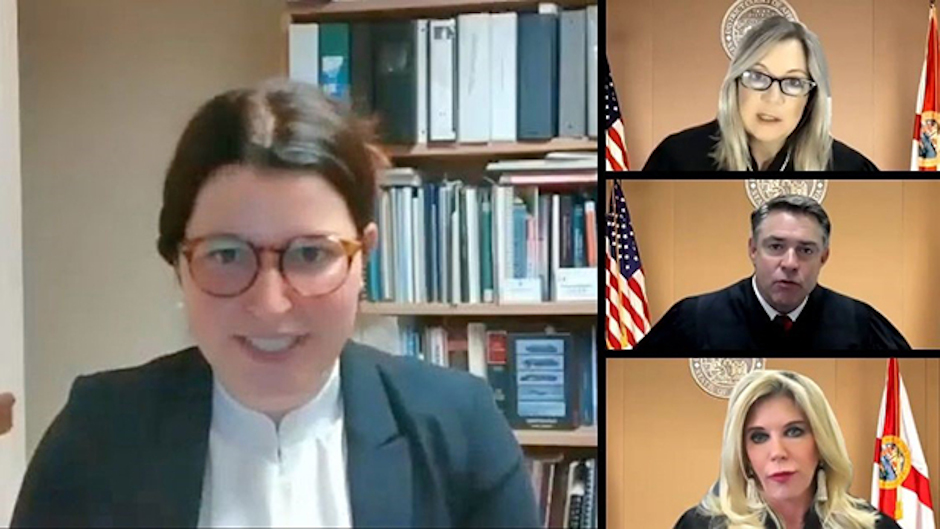Kristen Calzadilla, who graduated from Miami Law in spring 2021, presented oral arguments in the Third District Court of Appeal as a certified legal intern in a case representing a client from Miami Law’s Children and Youth Law Clinic in front of three appellate judges. The case is fully briefed, and the court could rule at any time now that it has heard oral argument.
“The clinic offered me an incredible experience over the course of my 2L and 3L years to represent current and former foster children in various proceedings, including this most recent experience in front of the 3DCA,” said Calzadilla. “Over the last two years, I’ve gained so much incredible litigation experience, thanks to the trust I’d earned from Professors Perlmutter, Stewart, and Latham — but the experience arguing in front of the 3DCA was an absolute honor and is one that I will remember for the rest of my life.”
Certified Legal Intern program offers real-world experience to students
The appeal to the DCA arose out of an administrative hearing officer’s fair hearing decision denying the clinic’s client’s application for medical benefits from the Agency for Persons with Disabilities, as an intellectually disabled child. Calzadilla was one of two interns at the CYLC who had a lengthy administrative hearing early last year with testimony from several experts and fact witnesses supporting the clinic’s argument that their client, an 8-year-old foster child, qualifies for APD benefits under his intellectual disability diagnosis. The interns handled the fair hearing, and Calzadilla then wrote the briefs for the appeal.
In the briefs and arguments, Calzadilla argued that the hearing officer’s ruling violated the disability agency’s statute and rules as well as the U.S. Supreme Court decision in Hall v. Florida, a death penalty appeal that arose in Florida. SCOTUS held that Florida violated the cruel and unusual punishment clause of the 8th Amendment by failing to consider evidence of Freddie Hall’s intellectual disability to mitigate his death sentence.
Students benefit from couching by top practitioners
“All of the judges were really interested in our Hall v. Florida arguments, and Kristen handled their questions, even the curve balls, very adroitly,” said Bernard P. Perlmutter, professor of law and co-director of the clinic. “Judge Bronwyn Miller in particular seemed to be interested in the arguments that the final order’s failure to take IQ Standard Errors of Measurement into account, coupled with the finding of significant adaptive deficits, as described in the framework laid out in Hall, justified reversal or remand.
“Judge Edwin Scales intriguingly asked Kristen before she began her rebuttal whether a reversal and holding that Hall applies to this case would be the first such ruling in the state. She answered him perfectly,” Perlmutter said.
Calzadilla’s argument applied the reasoning of the Hall decision about how a court evaluates evidence of intellectual disability when an IQ score is slightly higher than two standard deviations below the mean (i.e., <70) to this appeal of the client’s Medicaid Waiver disability benefits denial.
“Kristen did a great job in the moot and she performed really well this morning in front of a hot bench consisting of Judges Scales, Lindsey, and Miller, and, Bernie, is to be commended as well for giving his students an opportunity to brief/argue actual cases and, most especially, to learn from him,” said attorney and adjunct professor Harvey Sepler, who mooted Calzadilla. “It is always thrilling to see our students arguing a real case before real judges.” Sepler is a senior assistant public defender who teaches a course on appellate advocacy and coaches the Charles C. Papy, Jr. Moot Court teams at Miami Law.
Read more about Miami Law’s Children and Youth Law Clinic
Read more about studying Family Law at MIami Law

